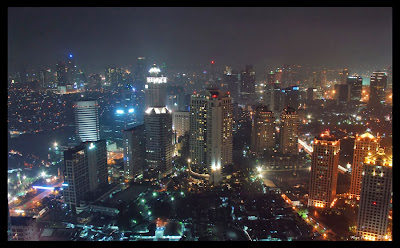
Listen to an audio version of this post at
http://media1.imbresources.org/files/103/10351/10351-55297.mp3
http://media1.imbresources.org/files/103/10351/10351-55297.mp3
Ten years ago this month, many people were wondering if the world would end with the beginning of the new millennium.
It didn’t happen, although in light of subsequent events, some might wish it had. TIME magazine recently dubbed 2000-2009 “The Decade from Hell” — a “10-year gauntlet” of trials and tribulations (see http://www.time.com/time/nation/article/0,8599,1942834,00.html).
It didn’t happen, although in light of subsequent events, some might wish it had. TIME magazine recently dubbed 2000-2009 “The Decade from Hell” — a “10-year gauntlet” of trials and tribulations (see http://www.time.com/time/nation/article/0,8599,1942834,00.html).
A partial list:
-- the Sept. 11 attacks, which ended any lingering hope of a peaceful post-Cold War world
-- innumerable smaller terrorist attacks from Madrid to Mumbai
-- wars and insurgencies in Iraq, Afghanistan, Lebanon, Congo, Yemen, Sri Lanka, Somalia and many other places
-- earthquakes that killed tens of thousands in China, Iran and Pakistan
-- a tsunami that swept away more than 200,000 people in Asia and Africa
As if those events weren’t devastating enough, a major economic downturn beginning in 2008 continues to cause untold hardships across the globe for hundreds of millions of workers and their families.
In a struggle that captured far fewer headlines, many Christian believers died for their faith during the decade — including eight Southern Baptist missionaries. Countless other followers of Christ have suffered violence, imprisonment, harassment and other forms of persecution for living and sharing their faith.
Would it have been better if the last 10 years had never occurred? To answer yes is to misunderstand God’s sovereignty. If He is the Lord of all history, He is the Lord of recent history. He uses all things, even tragedies and actions others intend for evil, to bless the nations and bring glory to Himself.
In a December 1999 column, I observed:
“The tumultuous 20th [century] staggers to an end this month. … Historians will recall many things about it: two world wars, the fall of old empires and rise of new ones, the devastation wrought by communism and totalitarianism, the Holocaust, the spread of democracy and capitalism, man on the moon, the computer, the Bomb. …
“[But] the fresh movement of God's Spirit is the real story of the century. How else to explain the staggering growth of the church, the Gospel's spread to countless places worldwide — not just in the West — and the glorifying of God's name among peoples who've never heard it until now? God isn't finished with us. … His Spirit is quietly, inexorably, powerfully moving — like a vast, unseen river.”
God is still moving. After the great tsunami and the Pakistan quake, whole communities and regions previously cut off from the Gospel experienced the love of Christ through relief and rebuilding efforts initiated by Christians. Military conflicts have opened spiritual doors as churches and mission workers aided suffering populations and refugees. The lives of believers who remained faithful under persecution have changed history among the people they love and serve.
Ten years ago, Rasheed* didn’t know Jesus Christ as Lord. Today he is one of the leaders of a growing movement of Muslim-background followers of Christ in India. But he’s paid the price for his new commitment. As I write this, he is recovering from a broken rib and other injuries — the result of the latest (and worst) beating he has suffered at the hands of people angered by his stand for Jesus.
He remains too weak to talk much, but one of his friends related what happened:
“Rasheed shared with a couple of Muslim men who both became [believers in Christ]. One of them went home and told his family. The men in the family gathered others from the community, and six of them found Rasheed and angrily asked him questions about what he had taught this new believer. As Rasheed attempted to explain, they began to beat him. One of the men pushed him down, and he hit his head on a pile of bricks as he fell. Another continued to beat him with a cricket bat until other villagers stopped the beating and took Rasheed to his brother.”
Rasheed is learning what the earliest disciples discovered in similar times: It isn’t easy to be a real follower of Christ. It’s hard. It costs everything — especially when you’re one of the first to commit yourself to Him.
But one day, Rasheed and the many souls he is leading to Christ will look back on “The Decade from Hell” as the moment when they found the way to heaven.
*(Name changed)
-- the Sept. 11 attacks, which ended any lingering hope of a peaceful post-Cold War world
-- innumerable smaller terrorist attacks from Madrid to Mumbai
-- wars and insurgencies in Iraq, Afghanistan, Lebanon, Congo, Yemen, Sri Lanka, Somalia and many other places
-- earthquakes that killed tens of thousands in China, Iran and Pakistan
-- a tsunami that swept away more than 200,000 people in Asia and Africa
As if those events weren’t devastating enough, a major economic downturn beginning in 2008 continues to cause untold hardships across the globe for hundreds of millions of workers and their families.
In a struggle that captured far fewer headlines, many Christian believers died for their faith during the decade — including eight Southern Baptist missionaries. Countless other followers of Christ have suffered violence, imprisonment, harassment and other forms of persecution for living and sharing their faith.
Would it have been better if the last 10 years had never occurred? To answer yes is to misunderstand God’s sovereignty. If He is the Lord of all history, He is the Lord of recent history. He uses all things, even tragedies and actions others intend for evil, to bless the nations and bring glory to Himself.
In a December 1999 column, I observed:
“The tumultuous 20th [century] staggers to an end this month. … Historians will recall many things about it: two world wars, the fall of old empires and rise of new ones, the devastation wrought by communism and totalitarianism, the Holocaust, the spread of democracy and capitalism, man on the moon, the computer, the Bomb. …
“[But] the fresh movement of God's Spirit is the real story of the century. How else to explain the staggering growth of the church, the Gospel's spread to countless places worldwide — not just in the West — and the glorifying of God's name among peoples who've never heard it until now? God isn't finished with us. … His Spirit is quietly, inexorably, powerfully moving — like a vast, unseen river.”
God is still moving. After the great tsunami and the Pakistan quake, whole communities and regions previously cut off from the Gospel experienced the love of Christ through relief and rebuilding efforts initiated by Christians. Military conflicts have opened spiritual doors as churches and mission workers aided suffering populations and refugees. The lives of believers who remained faithful under persecution have changed history among the people they love and serve.
Ten years ago, Rasheed* didn’t know Jesus Christ as Lord. Today he is one of the leaders of a growing movement of Muslim-background followers of Christ in India. But he’s paid the price for his new commitment. As I write this, he is recovering from a broken rib and other injuries — the result of the latest (and worst) beating he has suffered at the hands of people angered by his stand for Jesus.
He remains too weak to talk much, but one of his friends related what happened:
“Rasheed shared with a couple of Muslim men who both became [believers in Christ]. One of them went home and told his family. The men in the family gathered others from the community, and six of them found Rasheed and angrily asked him questions about what he had taught this new believer. As Rasheed attempted to explain, they began to beat him. One of the men pushed him down, and he hit his head on a pile of bricks as he fell. Another continued to beat him with a cricket bat until other villagers stopped the beating and took Rasheed to his brother.”
Rasheed is learning what the earliest disciples discovered in similar times: It isn’t easy to be a real follower of Christ. It’s hard. It costs everything — especially when you’re one of the first to commit yourself to Him.
But one day, Rasheed and the many souls he is leading to Christ will look back on “The Decade from Hell” as the moment when they found the way to heaven.
*(Name changed)
















